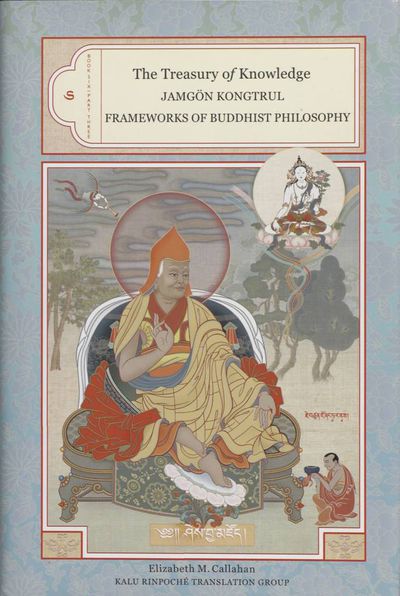Frameworks of Buddhist Philosophy
< Books
| Line 6: | Line 6: | ||
}} | }} | ||
|FullTextRead=No | |FullTextRead=No | ||
| − | |BookToc=* {{i|Foreword by Khenpo Tsültrim Gyamtso Rinpoche|7}} | + | |BookToc=* {{i|Foreword by Khenpo Tsültrim Gyamtso Rinpoche| 7}} |
| − | * {{i|Introduction|9}} | + | * {{i|Introduction| 9}} |
| − | * {{i|The Root Text: Frameworks of Buddhist Philosophy:A Systematic Presentation of the Cause-Based Philosophical Vehicles|57}} | + | * {{i|The Root Text: Frameworks of Buddhist Philosophy:A Systematic Presentation of the Cause-Based Philosophical Vehicles| 57}} |
| − | * {{i|1. Three Yānas and Four Tenet Systems|83}} | + | * {{i|1. Three Yānas and Four Tenet Systems| 83}} |
*'''Section I: Hīnayāna''' | *'''Section I: Hīnayāna''' | ||
| − | ** {{i|2. The Shrāvakayāna: An Overview and the Four Truths|87}} | + | ** {{i|2. The Shrāvakayāna: An Overview and the Four Truths| 87}} |
| − | ** {{i|3. The Shrāvakayāna: Its Tenet Systems, Orders, and Results|123}} | + | ** {{i|3. The Shrāvakayāna: Its Tenet Systems, Orders, and Results| 123}} |
| − | ** {{i|4. The Pratyekabuddhayāna|151}} | + | ** {{i|4. The Pratyekabuddhayāna| 151}} |
*'''Section II: Mahāyāna''' | *'''Section II: Mahāyāna''' | ||
| − | ** {{i|5. The Mahāyāna’s Distinctions and Training|161}} | + | ** {{i|5. The Mahāyāna’s Distinctions and Training| 161}} |
| − | ** {{i|6. Chittamātra|175}} | + | ** {{i|6. Chittamātra| 175}} |
| − | ** {{i|7. An Overview of Madhyamaka|195}} | + | ** {{i|7. An Overview of Madhyamaka| 195}} |
| − | ** {{i|8. Rangtong-Madhyamaka|203}} | + | ** {{i|8. Rangtong-Madhyamaka| 203}} |
| − | ** {{i|9. Svātantrika|217}} | + | ** {{i|9. Svātantrika| 217}} |
| − | ** {{i|10. Prāsaṅgika|223}} | + | ** {{i|10. Prāsaṅgika| 223}} |
| − | ** {{i|11. Shentong-Madhyamaka|249}} | + | ** {{i|11. Shentong-Madhyamaka| 249}} |
| − | ** {{i|12. Secret Mantra-Madhyamaka|269}} | + | ** {{i|12. Secret Mantra-Madhyamaka| 269}} |
| − | * {{i|Appendix: Outline of the Text|275}} | + | * {{i|Appendix: Outline of the Text| 275}} |
| − | * {{i|Glossary|283}} | + | * {{i|Glossary| 283}} |
| − | * {{i|Endnotes|301}} | + | * {{i|Endnotes| 301}} |
| − | * {{i|Bibliography of Works Cited by the Author|407}} | + | * {{i|Bibliography of Works Cited by the Author| 407}} |
| − | * {{i|Reference Bibliography|423}} | + | * {{i|Reference Bibliography| 423}} |
| − | * {{i|Index|459}} | + | * {{i|Index| 459}} |
|AddRelatedTab=No | |AddRelatedTab=No | ||
|PostStatus=Needs Copy Editing | |PostStatus=Needs Copy Editing | ||
}} | }} | ||
Revision as of 06:50, 29 January 2020
In Tibetan religious literature, Jamgön Kongtrül's Treasury of Knowledge in ten books stands out as a unique, encyclopedic masterpiece embodying the entire range of Buddhist teachings as it was preserved in Tibet. This volume, Frameworks of Buddhist Philosophy, is his masterful survey of the broad themes and subtle philosophical points found in more than fifteen hundred years of Buddhist philosophical writings. In a clear and systematic manner, he sets out the traditional framework of Buddhism's three vehicles and four philosophical systems, and provides an overview of the key points of each system. His syncretic approach, which emphasizes the strengths of each of the systems and incorporates them into a comprehensive picture of philosophical endeavor, is well-suited for scholar-practitioners who seek awakening through the combination of analytical inquiry and meditation. (Source: Shambhala Publications)
| Citation | Callahan, Elizabeth M. (Kalu Rinpoché Translation Group), trans. The Treasury of Knowledge, Book Six, Part Three: Frameworks of Buddhist Philosophy, A Systematic Presentation of the Cause-Based Philosophical Vehicles. By Jamgön Kongtrul Lodrö Tayé ('jam mgon kong sprul blo gros mtha' yas). Ithaca, NY: Snow Lion Publications, 2007. |
|---|---|

